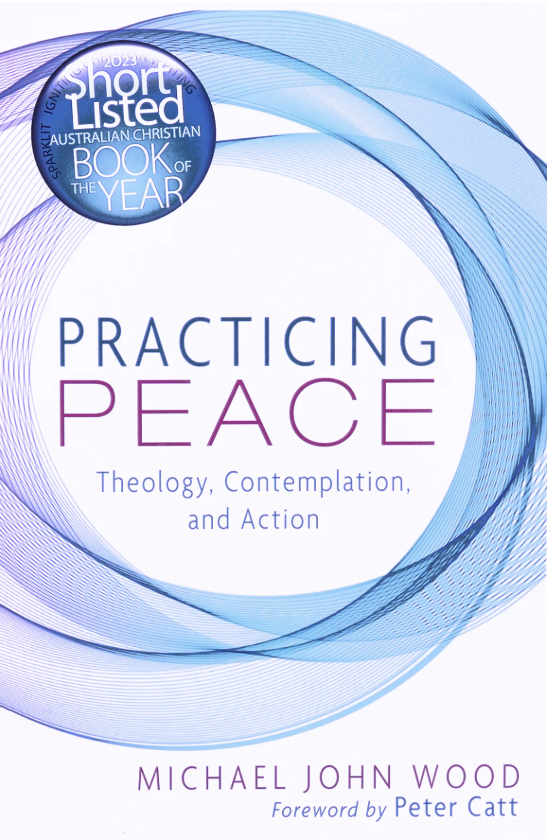Book Review: Practicing Peace: Theology, Contemplation, and Action
Tuesday, 26 November 2024
| Neville Carr

Practicing Peace: Theology, Contemplation, and Action
By Michael J. Wood
(Eugene, OR: Wipf and Stock, Eugene, 2022)
Wood’s book, which was shortlisted for the 2023 Australian Christian Book of the Year, is about how we learn to practise peace in our communities and organisations and in relation to the natural world. It’s aimed at church leaders responsible for ‘those who want to inspire, model, and foster positive relationships in their church communities’. It provides ‘theological and practical frameworks and tools … regardless of whether we are in structural positions of authority’. The framework of the title and structure of the book highlight three ways of knowing, or epistemologies: theology, contemplation, action (1, 2). Acknowledging the theological influence of Rene Girard and Douglas Campbell, it is only out of God’s nature that the peace Jesus gives colours both our social life and a sustainable relationship with the earth itself.
In terms of his theological discussion, I liked Wood’s distinction between non-violence and pacifism, where the former is committed to ‘mindsets and actions that honour the dignity of others – an expression of Shalom’ (12). However, I differ on some points:
firstly, that for Christians the creation story begins at John 1:1, not Gen.1:1 (20);
secondly, that the Greek word for ‘righteousness’ is best translated as ‘deliverance’ (63), rather than the notion of reestablishing right order in relationships (relational integrity);
thirdly, and more alarmingly, the idea that the language of hell is ‘a teaching and pastoral intervention, as a warning, a wake-up call’: ‘It would seem more in the nature of the Christlike God that Christ would visit hell to finally heal people’s grief, pain, and trauma sufficiently for them to reach out to him and be raised with him … no one is beyond the love of God, even in death/hell’ (126f). One is tempted to ask, therefore, whether the Cross was necessary after all, or whether the devil or Hitler will get into heaven!
In his discussion on contemplative prayer, Wood describes this as a significant ‘practice of peace’ that cultivates ‘deep attention, typically through the repeated and gentle repetition of a word or phrase of scripture, as well as attention to the breath’. It helps ‘reorient our desire towards God’ and let go of the ‘immediate concerns of the ego’ – a ‘way of loving our neighbour’ (137f).
The final part of the book explores peace as a practice for all kinds of organisational and community contexts - through dialogue, listening and circle processes of restorative justice, reflective practice and nonviolent action. There’s a wealth of practical strategies for bringing groups together to resolve conflicts, starting with ‘appreciative inquiry’: looking at what works well in a community, before looking at what doesn’t, which may make things worse (176).
After outlining principles of ‘Collaborative Emergent Design’, Wood suggests a five-step non-violent conversation structure, based on ‘reflective practice’: namely, observe what’s going on inside myself, centre myself, listen to the truth of the other, speak my own truth, discern a larger truth (201-208).
Wood leaves the reader with this vision: ‘Imagine the church throughout the world as constituting an international academy of peace, focused on the Christlike God, shaped by contemplative prayer, and practicing the art of dialogue. This could be a small contribution that Christians could make to the world’ (223).
Several appendices offer further resources for groups involved in peacemaking. The book ends with a comprehensive bibliography, and each chapter with a helpful summary and reflection. I enjoyed Peter Catt’s thoughtful Foreword (ix-xii). A more trivial comment: the US spelling (e.g. ‘practicing’) was somewhat irritating, when the author is Australian!
One important omission, perhaps, was the formative biblical role and model of parents in equipping children and young people to deal with conflict and work for peace: ‘Start children off on the way they should go, and even when they are old they will not turn from it’ (Prov 22:6). Another was a subject index, for anyone wanting to explore particular topics more deeply.
Despite my theological reservations, I can nevertheless recommend this book as a thoroughly useful practical aid for pastors, parents, church leaders and Christian educators, in working to resolve conflicts, starting with their own self-examination and contemplative prayer.
Neville Carr was the former Dean of Humanities and Education, St John’s University, Tanzania. He is Chair of the Ethics Committee of the Christian Research Association and was Chair of the Academic Board of Eastern College.